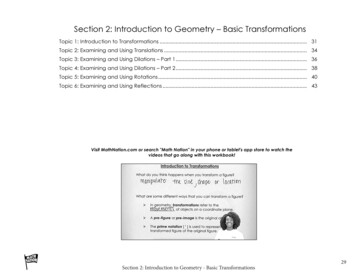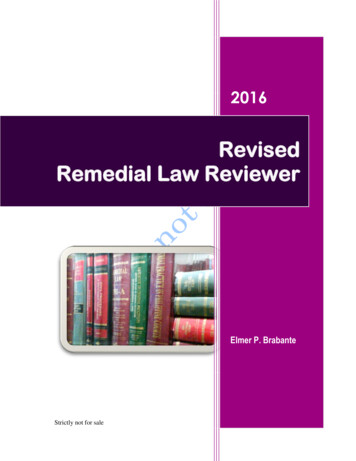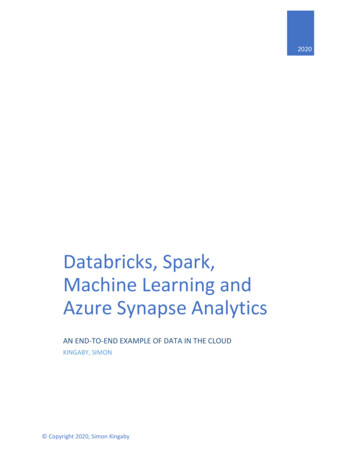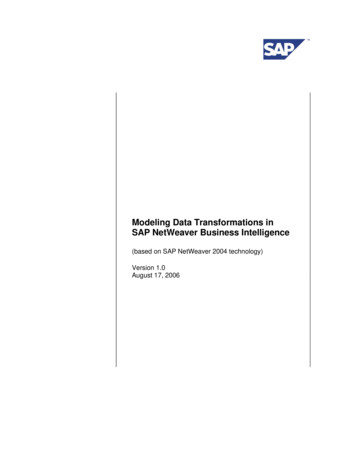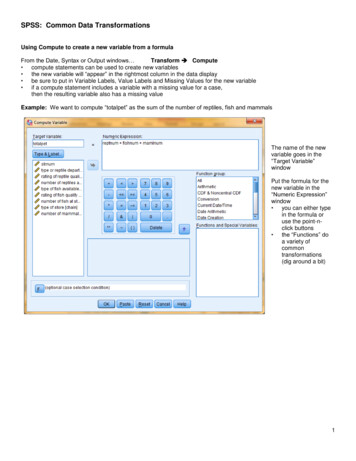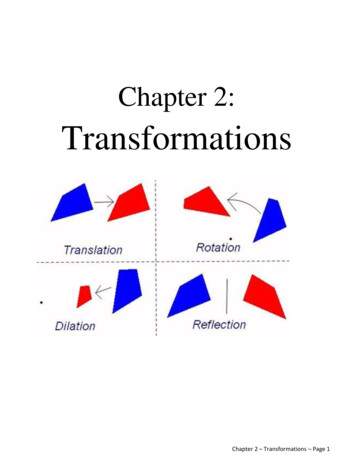
Transcription
TRANSFORMATIONS AND fA Visual Guide of the API
LinkedInBlog: data-frackDatabricks would like to give a special thanks to Jeff Thomspon for contributing 67visual diagrams depicting the Spark API under the MIT license to the Sparkcommunity.Jeff’s original, creative work can be found here and you can read more aboutJeff’s project in his blog post.After talking to Jeff, Databricks commissioned Adam Breindel to further evolveJeff’s work into the diagrams you see in this deck.
making big data simple Founded in late 2013 by the creators of Apache Spark Original team from UC Berkeley AMPLab Raised 47 Million in 2 rounds 55 employees We’re hiring!(http://databricks.workable.com) Level 2/3 support partnerships with Hortonworks MapR DataStaxDatabricks Cloud:“A unified platform for building Big Data pipelines – from ETL toExploration and Dashboards, to Advanced Analytics and DataProducts.”
RDD ElementsRDDLegendkeyoriginal itemBpartition(s)transformedtypeAuser inputuser functionsemitted valueinputobject on driver
LegendRandomized operationSet Theory / Relational operationNumeric calculation
TRANSFORMATIONSOperations ACTIONS
easy mediumACTIONSTRANSFORMATIONSEssential Core & Intermediate Spark OperationsGeneralMath / Statistical samplemap WithIndexgroupBysortBy ggregatetreeReduceforEachPartitioncollectAsMap sampleVariancecountApproxcountApproxDistinctSet Theory / Relational unionintersectionsubtractdistinctcartesianzip takeOrderedData Structure / I/O pe pDatasetsaveAsNewAPIHadoopFile
easy mediumACTIONSTRANSFORMATIONSEssential Core & Intermediate PairRDD OperationsGeneral lyfoldByKeyaggregateByKeysortByKeycombineByKey keys valuesMath / StatisticalSet Theory / Relational sampleByKey cogroup ( ByKeycountByKeyApproxsampleByKeyExactData Structure partitionBy
vsnarroweach partition of the parent RDD is used byat most one partition of the child RDDwidemultiple child RDD partitions may dependon a single parent RDD partition
“One of the challenges in providing RDDs as an abstraction is choosing arepresentation for them that can track lineage across a wide range oftransformations.”“The most interesting question in designing this interface is how to representdependencies between RDDs.”“We found it both sufficient and useful to classify dependencies into two types: narrow dependencies, where each partition of the parent RDD is used by atmost one partition of the child RDD wide dependencies, where multiple child partitions may depend on it.”
narrowwideeach partition of the parent RDD is used byat most one partition of the child RDDmap, filterjoin w/ inputsco-partitionedunionmultiple child RDD partitions may dependon a single parent RDD partitiongroupByKeyjoin w/ inputs notco-partitioned
TRANSFORMATIONSCore Operations
MAPRDD: x3 items in RDD
MAPRDD: xRDD: yUser functionapplied item by item
MAPRDD: xRDD: y
MAPRDD: xRDD: y
After map() has been applied MAPRDD: xbeforeRDD: yafter
MAPRDD: xRDD: yReturn a new RDD by applying a function to each element of this RDD.
RDD: yRDD: xMAPmap(f, preservesPartitioning False)Return a new RDD by applying a function to each element of this RDDx sc.parallelize(["b", "a", "c"])y x.map(lambda z: (z, 1))print(x.collect())print(y.collect())x: ['b', 'a', 'c']y: [('b', 1), ('a', 1), ('c', 1)]val x sc.parallelize(Array("b", "a", "c"))val y x.map(z (z,1))println(x.collect().mkString(", "))println(y.collect().mkString(", "))
FILTERRDD: x3 items in RDD
FILTERRDD: xRDD: yApply user function:keep item if functionreturns trueTrueemits
FILTERRDD: xFalseemitsRDD: y
FILTERRDD: xTrueemitsRDD: y
After filter() has been applied FILTERRDD: xbeforeRDD: yafter
RDD: yRDD: xFILTERfilter(f)Return a new RDD containing only the elements that satisfy a predicatex sc.parallelize([1,2,3])y x.filter(lambda x: x%2 1) #keep odd valuesprint(x.collect())print(y.collect())x: [1, 2, 3]y: [1, 3]val x sc.parallelize(Array(1,2,3))val y x.filter(n n%2 1)println(x.collect().mkString(", "))println(y.collect().mkString(", "))
FLATMAPRDD: x3 items in RDD
FLATMAPRDD: xRDD: y
FLATMAPRDD: xRDD: y
FLATMAPRDD: xRDD: y
FLATMAPAfter flatmap() has been applied RDD: xbeforeRDD: yafter
FLATMAPRDD: xRDD: yReturn a new RDD by first applying a function to all elements of this RDD, and then flattening the results
RDD: xRDD: yFLATMAPflatMap(f, preservesPartitioning False)Return a new RDD by first applying a function to all elements of this RDD, and then flattening the resultsx sc.parallelize([1,2,3])y x.flatMap(lambda x: (x, x*100, 42))print(x.collect())print(y.collect())x: [1, 2, 3]y: [1, 100, 42, 2, 200, 42, 3, 300, 42]val x sc.parallelize(Array(1,2,3))val y x.flatMap(n Array(n, n*100, 42))println(x.collect().mkString(", "))println(y.collect().mkString(", "))
GROUPBYRDD: x4 items in RDDJamesAnnaFredJohn
GROUPBYRDD: xRDD: yJamesAnnaFredJohn‘J’emitsJ[ “John” ]
GROUPBYRDD: xRDD: yJamesAnnaJohn‘F’emits[ “Fred” ]FFredJ[ “John” ]
GROUPBYRDD: xRDD: yJamesJohnemits[ “Fred” ]FFred‘A’[ “Anna” ]AAnnaJ[ “John” ]
GROUPBYRDD: xRDD: yJames‘J’[ “Fred” ]FFredemits[ “Anna” ]AAnnaJohnJ[ “John”, “James” ]
RDD: yRDD: xGROUPBYgroupBy(f, numPartitions None)Group the data in the original RDD. Create pairs where the key is the output ofa user function, and the value is all items for which the function yields this key.x sc.parallelize(['John', 'Fred', 'Anna', 'James'])y x.groupBy(lambda w: w[0])print [(k, list(v)) for (k, v) in y.collect()]x: ['John', 'Fred', 'Anna', 'James']val x sc.parallelize(Array("John", "Fred", "Anna", "James"))val y x.groupBy(w w.charAt(0))println(y.collect().mkString(", "))y: '])]
GROUPBYKEYPair RDD: xB5 items in RDD5B4A3A2A 1
GROUPBYKEYPair RDD: xBRDD: y5B4A3A2A 1A[2,3,1]
GROUPBYKEYPair RDD: xBRDD: y5B4A3AB[5,4]2A 1A[2,3,1]
RDD: yRDD: xGROUPBYKEYgroupByKey(numPartitions None)Group the values for each key in the original RDD. Create a new pair where theoriginal key corresponds to this collected group of values.x A',1)])y x.groupByKey()print(x.collect())print(list((j[0], list(j[1])) for j in y.collect()))x: [('B', 5),('B', 4),('A', 3),('A', 2),('A', 1)]val x 2),('A',1)))val y x.groupByKey()println(x.collect().mkString(", "))println(y.collect().mkString(", "))y: [('A', [2, 3, 1]),('B',[5, 4])]
MAPPARTITIONSRDD: xRDD: yBpartitionsBAA
REDUCEBYKEYVSGROUPBYKEYval words Array("one", "two", "two", "three", "three", "three")val wordPairsRDD sc.parallelize(words).map(word (word, 1))val wordCountsWithReduce wordPairsRDD.reduceByKey( ).collect()val wordCountsWithGroup wordPairsRDD.groupByKey().map(t (t. 1, t. 2.sum)).collect()
REDUCEBYKEY(a, 1)(b, 1)(a,(a,(b,(b,(a, 1)(b, 1)1)1)1)1)(a, 2)(b, 2)a(a, 1)(a, 2)(a, 3)(a,(a,(a,(b,(b,b(a, 6)(b, 1)(b, 2)(b, 2)(b, 5)1)1)1)1)1)(a, 3)(b, 2)
GROUPBYKEY(a,(a,(b,(b,(a, 1)(b, 1)1)1)b(a, 6)(b,(b,(b,(b,(b,1)1)1)1)1)(b, 5)1)1)1)1)1)
MAPPARTITIONSBBAAmapPartitions(f, preservesPartitioning False)Return a new RDD by applying a function to each partition of this RDDx sc.parallelize([1,2,3], 2)def f(iterator): yield sum(iterator); yield 42x: [[1], [2, 3]]y x.mapPartitions(f)y: [[1, 42], [5, 42]]# glom() flattens elements on the same ollect())
MAPPARTITIONSBBAAmapPartitions(f, preservesPartitioning False)Return a new RDD by applying a function to each partition of this RDDval x sc.parallelize(Array(1,2,3), 2)def f(i:Iterator[Int]) { (i.sum,42).productIterator }x: Array(Array(1), Array(2, 3))val y x.mapPartitions(f)y: Array(Array(1, 42), Array(5, 42))// glom() flattens elements on the same partitionval xOut x.glom().collect()val yOut y.glom().collect()
MAPPARTITIONSWITHINDEXRDD: xRDD: yBpartitionsBAAinputpartition index
MAPPARTITIONSWITHINDEXBBAApartition indexmapPartitionsWithIndex(f, preservesPartitioning False)Return a new RDD by applying a function to each partition of this RDD,while tracking the index of the original partitionx sc.parallelize([1,2,3], 2)def f(partitionIndex, iterator): yield (partitionIndex, sum(iterator))BAy x.mapPartitionsWithIndex(f)x: [[1], [2, 3]]# glom() flattens elements on the same ollect())y: [[0, 1], [1, 5]]
MAPPARTITIONSWITHINDEXBBAApartition indexmapPartitionsWithIndex(f, preservesPartitioning False)Return a new RDD by applying a function to each partition of this RDD,while tracking the index of the original partition.val x sc.parallelize(Array(1,2,3), 2)def f(partitionIndex:Int, i:Iterator[Int]) {(partitionIndex, i.sum).productIterator}BAx: Array(Array(1), Array(2, 3))val y x.mapPartitionsWithIndex(f)// glom() flattens elements on the same partitionval xOut x.glom().collect()val yOut y.glom().collect()y: Array(Array(0, 1), Array(1, 5))
SAMPLERDD: xRDD: y5413213
RDD: yRDD: xSAMPLEsample(withReplacement, fraction, seed None)Return a new RDD containing a statistical sample of the original RDDx sc.parallelize([1, 2, 3, 4, 5])y x.sample(False, 0.4, 42)print(x.collect())print(y.collect())x: [1, 2, 3, 4, 5]val x sc.parallelize(Array(1, 2, 3, 4, 5))val y x.sample(false, 0.4)// omitting seed will yield different outputprintln(y.collect().mkString(", "))y: [1, 3]
UNIONRDD: xRDD: y34321BCARDD: z43321CBA
UNIONReturn a new RDD containing all items from two original RDDs. Duplicates are not culled.union(otherRDD)x sc.parallelize([1,2,3], 2)y sc.parallelize([3,4], 1)z x.union(y)print(z.glom().collect())x: [1, 2, 3]y: [3, 4]valvalvalvalx sc.parallelize(Array(1,2,3), 2)y sc.parallelize(Array(3,4), 1)z x.union(y)zOut z.glom().collect()z: [[1], [2, 3], [3, 4]]
JOINRDD: xRDD: y5B2BAA14A3
JOINRDD: xRDD: y5B2BAA14ARDD: zA(1, 3)3
JOINRDD: xRDD: y5B2BAA14ARDD: zA(1, 4)A(1, 3)3
JOINRDD: xRDD: y5B2BAA14ARDD: z(2, 5)BA(1, 4)A(1, 3)3
JOINReturn a new RDD containing all pairs of elements having the same key in the original RDDsunion(otherRDD, numPartitions None)x sc.parallelize([("a", 1), ("b", 2)])y sc.parallelize([("a", 3), ("a", 4), ("b", 5)])z x.join(y)print(z.collect())x: [("a", 1), ("b", 2)]y: [("a", 3), ("a", 4), ("b", 5)]z: [('a', (1, 3)), ('a', (1, 4)), ('b', (2, 5))]val x sc.parallelize(Array(("a", 1), ("b", 2)))val y sc.parallelize(Array(("a", 3), ("a", 4), ("b", 5)))val z x.join(y)println(z.collect().mkString(", "))
DISTINCTRDD: x43321
DISTINCTRDD: xRDD: y4433332211
DISTINCTRDD: xRDD: y443332121
* DISTINCT* *Return a new RDD containing distinct items from the original RDD (omitting all duplicates)distinct(numPartitions None)x sc.parallelize([1,2,3,3,4])y x.distinct()print(y.collect())x: [1, 2, 3, 3, 4]y: [1, 2, 3, 4]val x sc.parallelize(Array(1,2,3,3,4))val y x.distinct()println(y.collect().mkString(", "))
COALESCERDD: xCBA
COALESCERDD: xRDD: yCBAAB
COALESCERDD: xCRDD: yCBAAB
CCCOALESCEBABAReturn a new RDD which is reduced to a smaller number of partitionscoalesce(numPartitions, shuffle False)x sc.parallelize([1, 2, 3, 4, 5], 3)y ().collect())x: [[1], [2, 3], [4, 5]]y: [[1], [2, 3, 4, 5]]valvalvalvalx sc.parallelize(Array(1, 2, 3, 4, 5), 3)y x.coalesce(2)xOut x.glom().collect()yOut y.glom().collect()
KEYBYRDD: xRDD: yJamesAnnaFredJohn‘J’emitsJ“John”
KEYBYRDD: xRDD: yJamesAnnaFredFJohn‘F’“Fred”J“John”
KEYBYRDD: xRDD: �John”
KEYBYRDD: xJamesJAnna‘J’“James”AFredemitsRDD: y“Anna”FJohn“Fred”J“John”
RDD: yRDD: xKEYBYkeyBy(f)Create a Pair RDD, forming one pair for each item in the original RDD. Thepair’s key is calculated from the value via a user-supplied function.x sc.parallelize(['John', 'Fred', 'Anna', 'James'])y x.keyBy(lambda w: w[0])print y.collect()x: ['John', 'Fred', 'Anna', 'James']val x sc.parallelize(Array("John", "Fred", "Anna", "James"))val y x.keyBy(w w.charAt(0))println(y.collect().mkString(", "))y: s')]
PARTITIONBYRDD: xJ“John”A“Anna”F“Fred”J“James”
PARTITIONBYRDD: xJ“John”AJ“Anna”F“Fred”J1RDD: y“James”“James”
PARTITIONBYRDD: D: y“James”F“Fred”
PARTITIONBYRDD: xJ“John”AJ“Anna”F“Fred”J0RDD: y“James”“James”A“Anna”F“Fred”
PARTITIONBYRDD: D: y“James”“James”A“Anna”F“Fred”
PARTITIONBYReturn a new RDD with the specified number of partitions, placing originalitems into the partition returned by a user supplied functionpartitionBy(numPartitions, partitioner portable hash)x nna'),('J','John')], 3)y x.partitionBy(2, lambda w: 0 if w[0] 'H' else 1)print x.glom().collect()print y.glom().collect()x: [[('J', 'James')], [('F', 'Fred')],[('A', 'Anna'), ('J', 'John')]]y: [[('A', 'Anna'), ('F', 'Fred')],[('J', 'James'), ('J', 'John')]]
PARTITIONBYReturn a new RDD with the specified number of partitions, placing originalitems into the partition returned by a user supplied function.partitionBy(numPartitions, partitioner portable hash)import org.apache.spark.Partitionerval x A',"Anna"),('J',"John")), 3)val y x.partitionBy(new Partitioner() {val numPartitions 2def getPartition(k:Any) {if (k.asInstanceOf[Char] 'H') 0 else 1}})val yOut y.glom().collect()x: Array(Array((A,Anna), (F,Fred)),Array((J,John), (J,James)))y: Array(Array((F,Fred), (A,Anna)),Array((J,John), (J,James)))
ZIPRDD: xRDD: y39241B1BAA
ZIPRDD: xRDD: y392411BBAARDD: z41A1
ZIPRDD: xRDD: y392411BBAARDD: z4241A1
ZIPRDD: xRDD: y392411BBAARDD: z439241BA1
ZIPReturn a new RDD containing pairs whose key is the item in the original RDD, and whosevalue is that item’s corresponding element (same partition, same index) in a second RDDzip(otherRDD)x sc.parallelize([1, 2, 3])y x.map(lambda n:n*n)z x.zip(y)print(z.collect())x: [1, 2, 3]y: [1, 4, 9]val x sc.parallelize(Array(1,2,3))val y x.map(n n*n)val z x.zip(y)println(z.collect().mkString(", "))z: [(1, 1), (2, 4), (3, 9)]
ACTIONSCore Operations
vsdistributeddriveroccurs across the clusterresult must fit in driver JVM
GETNUMPARTITIONS2Bpartition(s)A
GETNUMPARTITIONS2BAgetNumPartitions()Return the number of partitions in RDDx sc.parallelize([1,2,3], 2)y (y)x: [[1], [2, 3]]val x sc.parallelize(Array(1,2,3), 2)val y x.partitions.sizeval xOut x.glom().collect()println(y)y: 2
COLLECT[Bpartition(s)A]
COLLECT[B]Acollect()Return all items in the RDD to the driver in a single listx sc.parallelize([1,2,3], 2)y x.collect()print(x.glom().collect())print(y)x: [[1], [2, 3]]val x sc.parallelize(Array(1,2,3), 2)val y x.collect()val xOut x.glom().collect()println(y)y: [1, 2, 3]
REDUCE43213emits
REDUCE4326input31emits
REDUCE410input631021
REDUCE************reduce(f)Aggregate all the elements of the RDD by applying a user functionpairwise to elements and partial results, and returns a result to the driverx sc.parallelize([1,2,3,4])y x.reduce(lambda a,b: a b)print(x.collect())print(y)val x sc.parallelize(Array(1,2,3,4))val y x.reduce((a,b) a b)println(x.collect.mkString(", "))println(y)x:[1, 2, 3, 4]y:10
AGGREGATE4321BA
AGGREGATE4321
AGGREGATE43([], 0)21([1], 1)emits
AGGREGATE4([], 0)321([2], 2)([1], 1)
AGGREGATE4321([1,2], 3)([2], 2)([1], 1)
AGGREGATE([], 0)43([3], 3)21([1,2], 3)([2], 2)([1], 1)
AGGREGATE([], 0)43([4], 4)([3], 3)21([1,2], 3)([2], 2)([1], 1)
AGGREGATE43([3,4], 7)([4], 4)([3], 3)21([1,2], 3)([2], 2)([1], 1)
AGGREGATE43([3,4], 7)([4], 4)([3], 3)21([1,2], 3)([2], 2)([1], 1)
AGGREGATE43([3,4], 7)21([1,2], 3)
AGGREGATE43([3,4], 7)([1,2,3,4], 10)([1,2], 3)([1,2,3,4], 10)21
AGGREGATE*****[(***),#]****aggregate(identity, seqOp, combOp)Aggregate all the elements of the RDD by:- applying a user function to combine elements with user-supplied objects,- then combining those user-defined results via a second user function,- and finally returning a result to the driver.seqOp lambda data, item: (data[0] [item], data[1] item)combOp lambda d1, d2: (d1[0] d2[0], d1[1] d2[1])x sc.parallelize([1,2,3,4])y x.aggregate(([], 0), seqOp, combOp)print(y)x:[1, 2, 3, 4]y:([1, 2, 3, 4], 10)
AGGREGATE*****[(***),#]****aggregate(identity, seqOp, combOp)Aggregate all the elements of the RDD by:- applying a user function to combine elements with user-supplied objects,- then combining those user-defined results via a second user function,- and finally returning a result to the driver.def seqOp (data:(Array[Int], Int), item:Int) (data. 1 : item, data. 2 item)def combOp (d1:(Array[Int], Int), d2:(Array[Int], Int)) (d1. 1.union(d2. 1), d1. 2 d2. 2)val x sc.parallelize(Array(1,2,3,4))val y x.aggregate((Array[Int](), 0))(seqOp, combOp)println(y)x:[1, 2, 3, 4]y:(Array(3, 1, 2, 4),10)
MAX1442
max14MAX42max()Return the maximum item in the RDDx sc.parallelize([2,4,1])y x.max()print(x.collect())print(y)x: [2, 4, 1]val x sc.parallelize(Array(2,4,1))val y x.maxprintln(x.collect().mkString(", "))println(y)y: 4
SUM1472
Σ14SUM72sum()Return the sum of the items in the RDDx sc.parallelize([2,4,1])y x.sum()print(x.collect())print(y)x: [2, 4, 1]val x sc.parallelize(Array(2,4,1))val y x.sumprintln(x.collect().mkString(", "))println(y)y: 7
MEAN142.333333332
x14MEAN2.33333332mean()Return the mean of the items in the RDDx sc.parallelize([2,4,1])y x.mean()print(x.collect())print(y)x: [2, 4, 1]val x sc.parallelize(Array(2,4,1))val y x.meanprintln(x.collect().mkString(", "))println(y)y: 2.3333333
STDEV11.247219142
σ14STDEV1.24721912stdev()Return the standard deviation of the items in the RDDx sc.parallelize([2,4,1])y x.stdev()print(x.collect())print(y)x: [2, 4, 1]val x sc.parallelize(Array(2,4,1))val y x.stdevprintln(x.collect().mkString(", "))println(y)y: 1.2472191
es”{'A': 1, 'J': 2, 'F': 1}
{A: 1, 'J': 2, 'F': 1}COUNTBYKEYcountByKey()Return a map of keys and counts of their occurrences in the RDDx sc.parallelize([('J', 'James'), ('F','Fred'),('A','Anna'), ('J','John')])y x.countByKey()print(y)x: [('J', 'James'), ('F','Fred'),('A','Anna'), ('J','John')]val x A',"Anna"),('J',"John")))val y x.countByKey()println(y)y: {'A': 1, 'J': 2, 'F': 1}
SAVEASTEXTFILE
SAVEASTEXTFILEsaveAsTextFile(path, compressionCodecClass None)Save the RDD to the filesystem indicated in the pathdbutils.fs.rm("/temp/demo", True)x o")y .fs.rm("/temp/demo", true)val x p/demo")val y ing(", "))x: [2, 4, 1]y: [u'2', u'4', u'1']
LAB
Q&A
visual diagrams depicting the Spark API under the MIT license to the Spark community. Jeff’s original, creative work can be found here and you can read more about Jeff’s project in his blog post. After talking to Jeff, Databricks commissioned Adam Breindel to further evolve Jef
